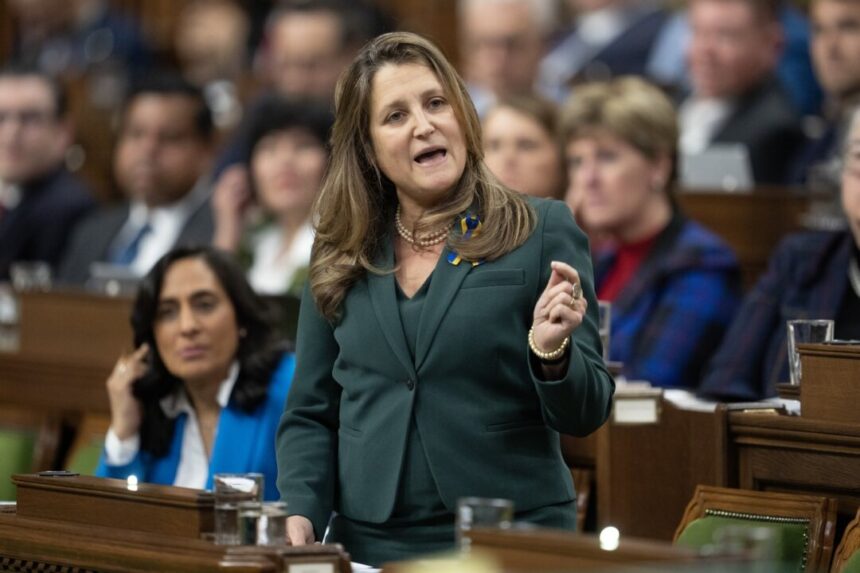Deputy Prime Minister Chrystia Freeland emphasizes that the federal government is collaborating with British Columbia to address the opioid crisis. However, she refrains from specifying when Ottawa will reverse the province’s drug decriminalization policy.
“The province of B.C. requested a temporary pilot project. B.C. now has concerns about that project, which we share,” Ms. Freeland stated during question period on May 2.
“We are now working together to address those concerns. Opioid addiction is a tragedy that has impacted far too many Canadian families. We must work together to find a solution, rather than exploiting the pain of Canadians for political gain.”
B.C. Premier David Eby recently urged Health Canada to modify the 2023 order that exempts certain illegal drugs, such as heroin, fentanyl, cocaine, and methamphetamine, from federal drug laws, decriminalizing possession of up to 2.5 grams.
“While we show care and compassion for those struggling with addiction, we cannot tolerate street disorder that makes communities feel unsafe,” Mr. Eby expressed on April 26.
The request came after numerous reports of drug use in public areas such as hospitals, bus stops, and parks throughout the province. Police, healthcare professionals, and local politicians have criticized the policy, stating that it has compromised public safety without effectively addressing drug abuse.
Ms. Freeland informed Parliament that she had been in communication with Mr. Eby and assured him that they are jointly addressing the concerns. However, she declined to respond to Opposition House Leader Andrew Scheer’s inquiry about the timeline for reversing the pilot project.
“It’s a straightforward question. It’s a simple decision to make. So once again, Mr. Speaker, on what date will this government make smoking crack in a hospital room illegal? Just the date,” Mr. Scheer queried.
“We share their concerns and are collaborating to uphold public health and safety,” Ms. Freeland replied. “What we will not do is capitalize on the pain, loss, and hardship experienced by Canadians.”
Toronto’s Drug Policies
Conservative Leader Pierre Poilievre has recently focused on B.C.’s drug policies, sending a letter to Prime Minister Justin Trudeau on May 1 urging him to reverse the government’s support for decriminalization in B.C. In the same letter, he also called on the government to reject Toronto’s plea for drug decriminalization.
“If you permit Toronto to legalize hard drugs, as you did in British Columbia, it will only result in abandoning the most vulnerable Canadians to a life of suffering and hopelessness,” he stated in the letter.
Toronto initially requested in 2022 for Ottawa to exempt all drugs for personal use in the city. In 2023, the city updated its request to include protection for young people from criminalization and to eliminate possession limits, surpassing B.C.’s drug policy.
Toronto Medical Officer of Health Dr. Eileen de Villa mentioned in a statement on April 30 that the city would continue implementing additional treatment initiatives. She noted that the proposal had been developed with input from various stakeholders, including Toronto police and individuals with experience using the drugs.
Addictions Minister Ya’ara Saks stated during question period that each request to Ottawa would be evaluated on a case-by-case basis. She added that Toronto Public Health’s proposal did not sufficiently address the dual objectives of public health and safety that have guided efforts to address the opioid crisis.
Can you please rewrite this sentence for me?
Source link








